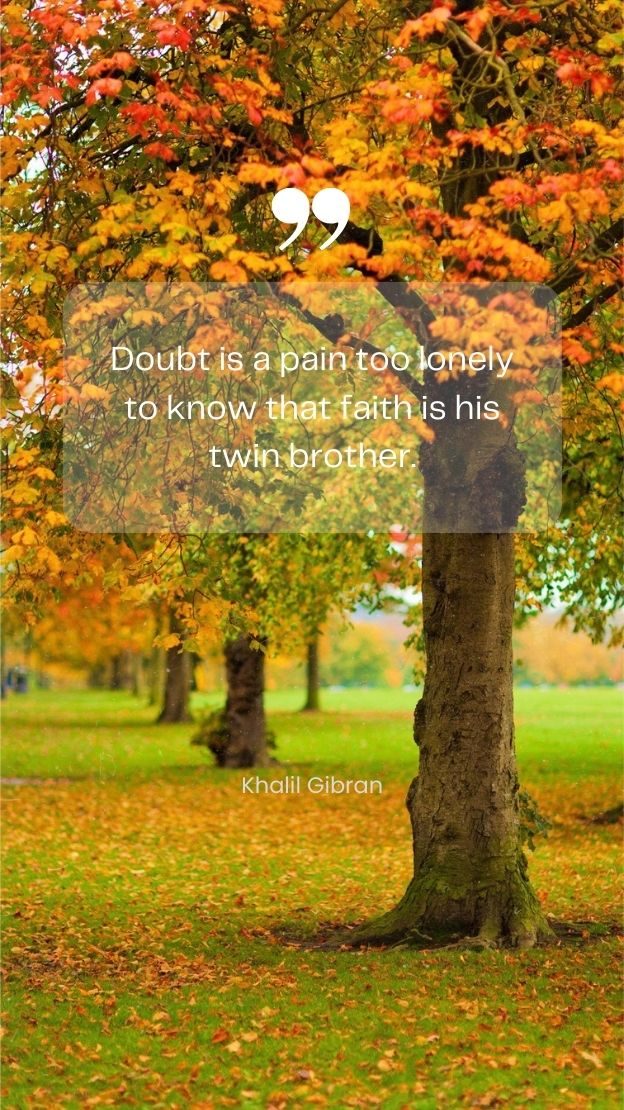Imagine standing at the edge of a cliff, with a vast expanse of sky above you and a roaring ocean below, feeling your heart race as you prepare to take a leap of faith. There are, undoubtedly, few experiences as exhilarating and simultaneously terrifying, as we walk that fine line between doubt and faith. In moments like these, we can find wisdom and solace in the words of the Lebanese-American writer, Kahlil Gibran, who wrote, “Doubt is a pain too lonely to know that faith is his twin brother.”
Just as there is light and darkness, day and night, and high tide and low tide, doubt and faith are the polar forces that govern the human experience. They might appear as contrasting impulses but understanding the deeply entwined relationship between faith and doubt enables us to harness their true potential.
The Inseparable Nature of Doubt and Faith
The realization that faith and doubt are intrinsically connected allows us to see them through a new lens, one where they are not mutually exclusive but rather, complementary forces. This relationship can be better understood through the metaphor of the two sides of a coin. While one side signifies doubt, the other signifies faith; and, like the two sides of a coin, one cannot exist without the other.
For example, imagine a couple who have always dreamed of having a family but are struggling with infertility. In this situation, it’s natural to experience a significant amount of doubt, wondering why these challenges persist despite their best efforts. Simultaneously, however, there is an unwavering faith that one day, their deepest desires will come to fruition. Both doubt and faith coexist in this precarious balance, constantly influencing each other’s stance.
Recognizing that faith relies on doubt to thrive prompts us to view these emotions in a different light. Instead of considering doubt as an obstacle to overcome, we can see it as an integral aspect of faith, one that fuels our determination to reach for possibilities beyond our initial doubts.
Embracing the Paradox
To fully understand and appreciate the paradox of doubt and faith, it’s crucial to accept that life is filled with uncertainties. By doing so, we can see that these two opposing forces balance and challenge each other, enabling us to grow and evolve.
Real-life examples can provide us with insights into this balance. Take, for instance, a college student who has doubts about choosing the right major. Her doubts lead her to question her skills and passions, ultimately prompting her to make a more informed decision, one that is more aligned with her true self. It is her faith in her potential that empowers her to face her doubts and delve deeper into her self-discovery.
Another example would be an entrepreneur who starts a new venture, risking his savings and putting his trust in his idea. He inevitably experiences doubt along the way that encourages him to hone his business acumen and tirelessly refine his strategies. It’s through the delicate interplay between his faith in his vision and allowing doubt to drive him forward that the entrepreneur has the possibility of achieving success.
Harnessing Doubt and Faith for Personal Growth
Learning how to recognize and utilize doubt and faith in our lives can lead to profound personal growth. When we harness the dynamic energy of this relationship, it enables us to arrive at a new and heightened state of self-awareness.
This journey starts with understanding that doubt is an essential aspect of growth. Like a fire that burns away the old and outdated, doubt serves as a catalyst for change, driving us to explore uncharted territories within ourselves. It’s by embracing doubt and making peace with its existence that our faith can truly bloom, much like a lotus flower rising from muddy waters.
For example, consider someone faced with a career change, weighing the pros and cons of leaving their current job to pursue their passion. Doubts will inevitably emerge, creating a sense of discomfort that might initially be difficult to overcome. However, by acknowledging these doubts, they can work towards creating a plan that accounts for potential obstacles and risks, ultimately resulting in a clearer and stronger sense of faith in their decision.
To learn how to tap into the power of doubt and faith, try incorporating self-reflective techniques into your routine, such as meditation or journaling. Doing so can provide you with insights into the ways these two forces are shaping your life, giving you the tools to acknowledge and work with them intentionally.
Conclusion
Kahlil Gibran’s quote, “Doubt is a pain too lonely to know that faith is his twin brother,” underscores the profound truth that faith is utterly entwined with doubt. Rather than resisting these emotions, we can choose to embrace their paradox, recognizing that one cannot exist without the other.
When we accept doubt as a driving force of our personal growth and view it as an ally of faith, we begin to understand the invaluable wisdom hidden in its depths. By fostering an awareness of this intricate relationship, we can use doubt and faith to navigate our lives with greater courage, resilience, and understanding.
Ultimately, living in a state of harmony between doubt and faith grants us the freedom to explore our potential and embrace the beautiful mystery of life. As Rumi, the great Sufi poet, once said, “The wound is the place where the Light enters you.” It is through accepting the inevitable pain of doubt that we can awaken our faith, allowing us to thrive in the dynamic dance of this precious human journey.
